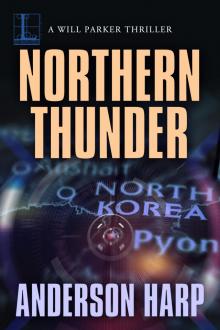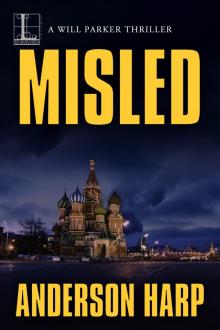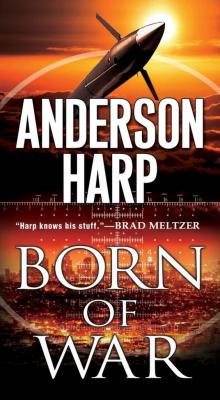- Home
- Anderson Harp
Northern Thunder
Northern Thunder Read online
Praise for RETRIBUTION by Anderson Harp
“Tense and authentic—reading this book is like living a real-life mission.”
—Lee Child
“Want to see what the military’s really like? Harp knows his stuff. Retribution proves that the scariest story is the true story. Here’s the real intelligence operation.”
—Brad Meltzer, bestselling author of The Fifth Assassin
“I seldom come across a thriller as authentic and well-written as Retribution. Harp brings his considerable military expertise to a global plot that’s exciting, timely, and believable. His characters are exceptionally well-drawn and convincing. If you like Tom Clancy’s work, you’ll love Retribution. Harp is very much his own man, however, and to say that I’m impressed is an understatement.”
—David Morrell, New York Times bestselling author of The Protector
“Harp’s Retribution is a stunner: a blow to the gut and shot of adrenaline. Here is a novel written with authentic authority and bears shocking relevance to the dangers of today. It reminds me of Tom Clancy at his finest. Put this novel on your must-read list—anything by Harp is now on mine.”
—James Rollins, New York Times bestselling author of Bloodline
“Retribution by Harp is an outstanding thriller with vivid characters, breakneck pacing, and suspense enough for even the most demanding reader. On top of that, Harp writes with complete authenticity and a tremendous depth of military knowledge and expertise. A fantastic read—don’t miss it!”
—Douglas Preston, #1 bestselling author of Impact
“Retribution by Harp is a fast-paced, suspenseful thriller loaded with vivid characters and backed by a depth of military knowledge. Top gun!”
—Kathy Reichs, #1 bestselling author of The Temperance Brennan and Tory Brennan series
Thrillers by Anderson Harp
BORN OF WAR
RETRIBUTION
Table of Contents
Praise for RETRIBUTION by Anderson Harp
Thrillers by Anderson Harp
Map
Dedication
Chapter 1
Chapter 2
Chapter 3
Chapter 4
Chapter 5
Chapter 6
Chapter 7
Chapter 8
Chapter 9
Chapter 10
Chapter 11
Chapter 12
Chapter 13
Chapter 14
Chapter 15
Chapter 16
Chapter 17
Chapter 18
Chapter 19
Chapter 20
Chapter 21
Chapter 22
Chapter 23
Chapter 24
Chapter 25
Chapter 26
Chapter 27
Chapter 28
Chapter 29
Chapter 30
Chapter 31
Chapter 32
Chapter 33
Chapter 34
Chapter 35
Chapter 36
Chapter 37
Chapter 38
Chapter 39
Chapter 40
Chapter 41
Chapter 42
Chapter 43
Chapter 44
Chapter 45
Chapter 46
Chapter 47
Chapter 48
Chapter 49
Epilogue
About the Author
Northern Thunder
Anderson Harp
LYRICAL UNDERGROUND
Kensington Publishing Corp.
www.kensingtonbooks.com
To the extent that the image or images on the cover of this book depict a person or persons, such person or persons are merely models, and are not intended to portray any character or characters featured in the book.
LYRICAL UNDERGROUND BOOKS are published by
Kensington Publishing Corp.
119 West 40th Street
New York, NY 10018
Copyright © 2007, 2019 by Anderson Harp
Map of Korea (c) Thom Hendrik
All rights reserved. No part of this book may be reproduced in any form or by any means without the prior written consent of the Publisher, excepting brief quotes used in reviews.
All Kensington titles, imprints, and distributed lines are available at special quantity discounts for bulk purchases for sales promotion, premiums, fund-raising, educational, or institutional use.
Special book excerpts or customized printings can also be created to fit specific needs. For details, write or phone the office of the Kensington Sales Manager: Kensington Publishing Corp., 119 West 40th Street, New York, NY 10018. Attn. Sales Department. Phone: 1-800-221-2647.
Lyrical Underground and Lyrical Underground logo Reg. US Pat. & TM Off.
First Electronic Edition: November 2019
ISBN-13: 978-1-5161-0975-3 (ebook)
ISBN-10: 1-5161-0975-9 (ebook)
First Print Edition: November 2019
ISBN-13: 978-1-5161-0979-1
ISBN-10: 1-5161-0979-1
Printed in the United States of America
Map
Dedication
To Siler
Chapter 1
A Flight Westbound, August 2011
“Is this seat 8A?”
Dr. Myler Harbinger looked up to see a young Asian-American man standing in the aisle. “Yes, I guess it is,” Harbinger said, glancing at the window seat beside him.
“Thank you,” said the stranger, who looked like one of Harbinger’s graduate students, no more than half the professor’s age. “If you’d rather have the window, I don’t mind.”
Harbinger had no preference. He simply wished to remain undisturbed. “No, I’ll stay here. Thank you.”
Wrinkled and disheveled, with reading glasses on his gray, bushy head and an unlit pipe in his mouth, Harbinger looked every inch the professor he was. He had hoped the flight from Washington, D.C. to San Francisco would provide him an opportunity to work on his most recent research project. He had treasured the promise of five hours of quiet time in the air, and he hoped his seat neighbor would quickly end the small talk. The muscles in his jaw flexed as he chewed on his favorite pipe, turning his attention back to the small pad he always carried. He had it placed on top of a worn leather satchel on the seat table, which was serving as his desk.
The young man took off his leather jacket, wiggled past the table and Harbinger’s knees, sat, and began reading a newspaper.
Out of the corner of his eye, Harbinger noticed the newspaper’s odd lettering. It was clearly from some other language.
“Excuse me, sir,” said a flight attendant, “but you’ll need to stow the table for takeoff. May I take that briefcase?”
“Yes, thank you.” Harbinger handed the satchel to her and, as she put it in the overhead bin, the tag hung out of the bin door:
Dr. Myler Harbinger, Ph.D.
121 Briar Street
Berkeley, California
“And your coat?”
The young stranger hesitated briefly, then handed it to her. It would be much later that she remembered the oddity of the jacket. It had no tags in it, as if the owner had cut them out with some specific purpose in mind.
“And, Professor, you do know you cannot light that pipe?”
“Yes” he replied. “Professor? What gave it away?”
“Just a wild guess.”
Th
e man next to the professor also knew Dr. Myler Harbinger’s occupation, but not from his luggage tag. He knew where Harbinger taught, how he dressed, what he liked and disliked. In fact, for several months, the man had researched every minute detail about the man sitting next to him, including the precise airplane seat assigned to him on this flight. A PhD in mathematics and the world’s leading mind on the development of GPS—the global positioning satellite network—Dr. Harbinger stood as the Grace Hopper of his time. Like Hopper, the famed naval captain, genius, and inventor of the COBOL computer system, Myler Harbinger was a decade ahead of all his peers—except, perhaps, one.
“Where do you teach?” the young man asked once the flight attendant had left.
“I’m at the engineering department at Berkeley.”
“Oh, a very fine school. And engineering—I thought the computer eliminated our need for mathematics and engineering.”
Harbinger kept his eyes on his pad of paper and humphed in response.
“I work in cable television in South Korea,” the man continued. “Without the satellite, we couldn’t exist.”
The comment hit strangely close to Harbinger’s work. Suddenly, he felt uncomfortable.
“What brought you to Washington, Doctor? Or do you prefer Professor?”
“A meeting on satellites at NASA.”
“Oh, really?” the stranger said as he leaned over, peering at the doctor’s notes.
Harbinger, feeling the man’s body enter his space, leaned back in his chair. “Excuse me,” he said.
“Sorry,” said the man, “I didn’t mean to cause you alarm. I was just curious. I find satellites most interesting. I cannot imagine a world without them. And the military—I would think it could be paralyzed if a satellite failed.”
Harbinger did not mention that this secret conference had been, curiously enough, on that very subject. He did not mention the representatives from U.S. Space Command, nor their concern that space debris, whether natural or intended, could destroy a satellite—nor the effect that would have on the military and its aging, costly fleet of satellites.
It became quiet again and, not long after, the stranger turned away, placed a pillow under his head, and fell asleep.
It was several hours before the flight attendant interrupted Harbinger. The other passenger was just emerging from a sound sleep.
Harbinger glanced at the man’s pale white hand. There was a scar covering the top of the right hand. It was a clean, deep scar with a sharp, clear edge—probably a knife wound, as if the man had protected himself from a blow.
He also noticed the ring on his other hand—unostentatious gold, and twisted in the shape of a dragon. To him, it looked out of place on the hand of a man who dressed so simply.
“Gentlemen,” the stewardess said, “we have about an hour until we reach San Francisco. I apologize for the late meal. Would you care to have the chicken or the steak for dinner?”
“I believe I have a special meal ordered,” said the professor. “Would you mind checking on that?”
“Certainly.” She turned to Harbinger’s seatmate. “And you, sir? What would you like?”
“Steak would be fine.”
Harbinger’s special request was a poor choice for his final meal.
* * * *
As the flight attendant cleared away their two trays, the young stranger struck up another conversation.
“Did you know the United States wastes more food in a week than the Democratic People’s Republic of Korea consumes in a year?”
Harbinger had taught long enough at Berkeley to know how to interpret a comment like that. To the rest of the world, the Democratic People’s Republic of Korea, or DPRK for short, was known simply as North Korea. South Korean businessmen did not refer to North Korea as the Democratic People’s Republic of Korea. Only someone from across the border of North Korea would refer to it that way.
“I’ve heard that North Korea has had a difficult time,” Harbinger said.
The stranger nodded. “Thirty-eight miles from Seoul, children are dying from malnutrition. They lie there, gasping for breath, a short drive from one of the largest, best-fed cities in the Pacific Rim.”
As Harbinger looked for a way to shift or stop the conversation, the pilot announced that the plane had been cleared for approach into San Francisco’s International Airport. The professor was thankful for the interruption. This young man was more than a cable television businessman from South Korea, and the more Harbinger heard, the more he wanted the flight to end.
He looked at his watch. His wife had agreed to pick him up at the airport. She was always perfectly on time. The landing could come not soon enough.
Thirty minutes later, as the aircraft taxied to the gate, Harbinger tried to turn his thoughts to the class he had to teach tomorrow.
The rush of people to the front of the aircraft caused a bottleneck in first class, and Harbinger did not notice his row-mate twisting the gold ring on his finger as he got up from his seat.
“Well, I hope your remaining journey is pleasant,” Harbinger said, trying to show some civility. He gestured for the young man to go ahead of him.
“You too, Doctor.” As the man passed Harbinger, he patted the professor lightly on the shoulder.
Harbinger felt a small prick as he joined the crowd surging toward the exit. They seemed to be moving more quickly now; the Korean was walking far ahead of Harbinger, who suddenly realized that he was holding up the passengers behind him. He tried to step forward but, as he did, pain struck his chest, as if a sledgehammer had knocked the breath out of his body, and he crumpled to the ground, his satchel plopping down beside him.
His fellow passengers found their anger turning to alarm as he fell, but none realized that Myler Harbinger, a world leader in micro-electronic technology, had a highly concentrated dose of sodium nitroprusside surging through his veins. His heart had frozen like an engine suddenly out of oil. The professor had been dead even before his body slumped to the aircraft floor.
Chapter 2
Outside of Vienna, Georgia
Across the nearly deserted country road stood a defunct gas station, a large sign declaring the availability of Diesel $.59/Gallon and Boiled Peanuts. The signs had bleached with time, and the price of the fuel gave some indication of the number of decades that had passed since it had last filled the tanks of its customers, but a small shack on the property still functioned as a store for locals.
“Where the hell is he?” the old man asked, wondering why the driver was taking so long to get directions.
In military parlance, the senior ranking officer was always the “old man.” For this “old man,” the scorching heat and humidity made everything unbearable—even sitting in the glossy black executive car with the air-conditioning at full blast.
The other passenger leaned forward and said, “I don’t think he’s been to Vienna before.” A faint British accent was evident in his words. Black sunglasses hid part of a scar running down his cheek.
They had stopped on the edge of Vienna, a small town in south Georgia not much larger than the one-block town square framed by the redbrick courthouse. Locals had come up with a special pronunciation: VEYE-anna. Any comparison to the Austrian city ended with the identical spellings.
“I don’t give a damn where he’s been or not been before,” Admiral Krowl told his companion. “I told the Marine Corps to have their best driver available—at least somebody who knows where to go.” The gas station’s screen door banged and a young Marine with lance corporal stripes jogged over to the car, hopped in, and shifted into drive.
Krowl leaned forward. “You know where to go now?”
“Yes, sir. Only seven more miles down on the right.” The lance corporal’s well-creased uniform was beginning to show signs of the heat, and perhaps of his high-pressure passenger.
Rear
Admiral Julius “Jig” Krowl could not stand waiting, whether in a car in rural Georgia or in a Pentagon briefing room. He also hated his nickname, but it had stuck. In his first week at the Naval Academy, “Julius” had been shortened by an old Marine mustanger who’d served in both World War II and Korea. “Julius? Bullshit,” the captain had barked. “Henceforth, you will be ‘Plebe Jig.’” The Marine was referring to the old phonetic designation for the letter J.
While he couldn’t change his nickname, Krowl, a high-ranking military official for a long, long time, had grown accustomed to getting his way on everything else.
“I can’t believe we have to resort to this,” he grumbled. “Surely, Langley could give us a better option.”
Beside him on the seat lay a thick folder marked Top Secret: CIA. Over its center was a large seal marked SCI, followed by a bright red warning that fines and imprisonment were the penalty for unauthorized use.
“If Langley had any other option,” said the other companion in the vehicle, “we would have used it.”
Krowl turned to him. “And this doesn’t work? Who will they go after?” Krowl was angry, not so much about the proposed idea, but that the CIA might rob him of the credit. As soon as he was sure this plan was a winner, Scott would be shoved to the background.
James Scott had heard admirals spout off before and, frankly, couldn’t have cared less. A career officer with the Agency, he’d learned a long time ago that the mission was primary. He had met the admiral only the day before, but Scott took pride in his ability to size up people quickly, and he sensed Krowl was a man to keep a close eye on.
When he answered Krowl, his words were slow and deliberate. “From our discussions in the EC yesterday, you know this is the best choice we have. We bloody well need him, and we need him badly.”
The EC, or executive center, was little known—even by many military insiders. In the Pentagon, no sanctum was more secret.
During their meeting the day before, even James Scott had been impressed. He’d seen many secret facilities during his years in intelligence, but this one was unique. The EC was the Secretary of Defense’s private war room. Soundproofing on all sides prevented any eavesdropping. An eye-scanning device had a limited history of those few it would let in. The assault on that infamous September day had had no impact upon the center. It remained impregnable.

 Northern Thunder
Northern Thunder Misled
Misled Born of War
Born of War